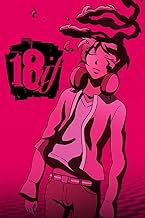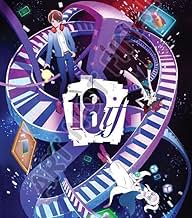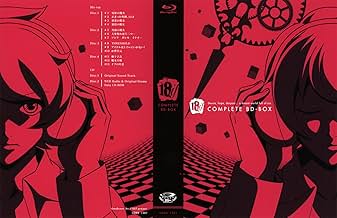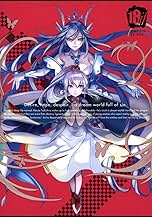Aggiungi una trama nella tua linguaA boy named Haruto Tsukishiro falls asleep one night and becomes trapped in a dream realm, where he must battle powerful witches "people with problems" by dream hopping; while searching for ... Leggi tuttoA boy named Haruto Tsukishiro falls asleep one night and becomes trapped in a dream realm, where he must battle powerful witches "people with problems" by dream hopping; while searching for a way to wake himself up.A boy named Haruto Tsukishiro falls asleep one night and becomes trapped in a dream realm, where he must battle powerful witches "people with problems" by dream hopping; while searching for a way to wake himself up.
Sfoglia gli episodi
Trama
Recensione in evidenza
Growing up is never easy, we all have our struggles along the way. Knowing that it will all be worth it eventually is what gives us the courage to persevere to adulthood.
18if tells the stories of multiple teenagers struggling with real-world problems in a very abstract fashion. Emotional turmoil is depicted through young women struggling to find happiness in the life they've been given; whether it be bullying, the weight of parental expectations, ostracizing, etcetera. These stories are played to resonate with the audience across 13 episodes, with varying degrees of success. The times it succeeds are rare but worthwhile indeed; even if as a full package it does not come together into a cohesive whole. Each episode of 18if has a different director and focuses on different themes; some of them are better than others but overall the show is superb at nothing and is frequently mediocre. Occasionally the art style might change from episode to episode, but it never reaches a good level of quality that could be compared to other episodic shows. If I had to label it with a genre I'd say it's a Drama, Horror, and Psychological; from time to time 18if dabbles in Romance, which felt uncomfortable to watch because each episode the protagonist tries to woo the new lady introduced. I understand that 18if is a multimedia project, but I'm writing my review solely based on the content of the 13-episode animated series. The content that fills those episodes is quite lacking so I can imagine the additional content expands the universe and further develops its characters.
The plot revolves around Haruto, a mysterious young man, and his struggle to save young women afflicted by "Sleeping Beauty Syndrome". The disease is brought on by severe emotional stress and it makes the afflicted person falls into a coma; once in the coma, the person can create an idyllic dream world as a method of escape from the harshness of reality. The concept is an interesting one indeed, the dream worlds sometimes were impressive in how they were able to describe what the afflicted character desired from life but didn't have in the real world. Only about half of the episodes develop the characters through the worlds they create, the other half just tries to weird you out as much as possible with little to no development on the characters. It felt like most of the directors didn't work together to write 18if's story cohesively, but instead, they vied to make the most memorable episode. For example; one of the better episodes takes inspiration from the genre classic "A Nightmare on Elm Street", Haruto delves into the subconscious of a girl who was mentally scarred by a horrific crime committed against her and she now kills criminals out of anger by invading their dreams. They may not have explained why she was able to kill people through her dreams, but that didn't bother me because the episode achieved its goal at deconstructing a character in an unusual way. On the flip side, there was a stink bomb of an episode where Haruto awakens in a world that resembles a children's storybook, visually and narratively, the episode has almost no relation to the main show other than the main character's name was still Haruto. There were a few episodes like this that felt like a viscous self-indulgence of a single director who appeared to have little interest in the show's narrative, which is sad considering some of the other directors put a lot of work into making episodes that contribute to the story.
The source of 18if's most perceivable issues is the fact that there is little connecting each episode until the finale. The first eleven episodes seem to be written individually from one another, so don't expect to feel much plot or character progression until the last two episodes. When the ending comes it revisits the major characters and recaps narrative highpoints in a way that I believe was meant to be satisfying... but it honestly just highlighted how messy and disjointed the story, tone, and characters are. The R+ rating comes from the conflict with the dreamers, the violence was sometimes gory; as a side note, there is a bit of profanity in episode 9 that is meant to be comedic but comes off as repulsive, thankfully it only happens just the one time. The script is usually passable, but occasionally it is so bad that it conveys a totally misguided message to the viewer. An example of this issue is in one of the more standard episodes that follow an ice skater who is pressured by her parents to succeed as a performer. The pressure she is faced with causes her to become afflicted by Sleeping Beauty Syndrome, once in a coma she creates a world where she can be a normal girl and live life without her harsh parents, which feels like an interesting and relatable escape for a suffering person. The episode is solid up until the end when Haruto arrives and tells her to go back to being an ice skater because it is her "destiny", which was appalling considering this concept betrayed the entire message of the episode and it went against her wishes. Most episodes weren't ruined by confusing writing like that one was, but the few that were misguided definitely stand out as an example of how to ruin a good short story. Many of the segments were tropey, with predictable scenarios and archetypical characters, but I was able to forgive this aspect easily because each episode brought a new theme to the table.
Even though the story is episodic there are three consistently present characters; they are Haruto, Haruto's guide/mentor a scientist who appears as a cat dressed as a detective in the dream world, and Lily, a girl who's only part of the story is to be a deus ex machina in the dream world. Sadly, the three leads rarely got development. The most interesting character of the three was the scientist who searches for a cure to the "Sleeping Beauty Syndrome" for his afflicted sister. I rooted for the scientist more than the protagonist because he had actually had a motivation to be a part of the conflict; whereas Haruto was impossible to identify with, becoming a completely blank slate at the start of each episode. As I said before, the visuals vary from episode to episode but they never are at the point which I would call above average. The music is for the most part standard. A bewildering opening starts off every episode and it does a good job at preparing you for the demented scenarios that will inevitably ensue. It has a really unusual EDM style song that I liked quite a bit but I can understand if someone wouldn't appreciate its funky style. Each episode has different outro credits and none of them are outstanding.
When I reflect on the time I spent watching 18if I remember the good moments more than the bad ones. While it's a mixed experience for sure, I definitely think the turnout leans slightly more to the positive side. Taken in bite-sized chunks I could imagine someone finding a great deal of enjoyment in this series. However, I'm reviewing it as a whole completed product and it, for the most part, failed to engage me.
18if tells the stories of multiple teenagers struggling with real-world problems in a very abstract fashion. Emotional turmoil is depicted through young women struggling to find happiness in the life they've been given; whether it be bullying, the weight of parental expectations, ostracizing, etcetera. These stories are played to resonate with the audience across 13 episodes, with varying degrees of success. The times it succeeds are rare but worthwhile indeed; even if as a full package it does not come together into a cohesive whole. Each episode of 18if has a different director and focuses on different themes; some of them are better than others but overall the show is superb at nothing and is frequently mediocre. Occasionally the art style might change from episode to episode, but it never reaches a good level of quality that could be compared to other episodic shows. If I had to label it with a genre I'd say it's a Drama, Horror, and Psychological; from time to time 18if dabbles in Romance, which felt uncomfortable to watch because each episode the protagonist tries to woo the new lady introduced. I understand that 18if is a multimedia project, but I'm writing my review solely based on the content of the 13-episode animated series. The content that fills those episodes is quite lacking so I can imagine the additional content expands the universe and further develops its characters.
The plot revolves around Haruto, a mysterious young man, and his struggle to save young women afflicted by "Sleeping Beauty Syndrome". The disease is brought on by severe emotional stress and it makes the afflicted person falls into a coma; once in the coma, the person can create an idyllic dream world as a method of escape from the harshness of reality. The concept is an interesting one indeed, the dream worlds sometimes were impressive in how they were able to describe what the afflicted character desired from life but didn't have in the real world. Only about half of the episodes develop the characters through the worlds they create, the other half just tries to weird you out as much as possible with little to no development on the characters. It felt like most of the directors didn't work together to write 18if's story cohesively, but instead, they vied to make the most memorable episode. For example; one of the better episodes takes inspiration from the genre classic "A Nightmare on Elm Street", Haruto delves into the subconscious of a girl who was mentally scarred by a horrific crime committed against her and she now kills criminals out of anger by invading their dreams. They may not have explained why she was able to kill people through her dreams, but that didn't bother me because the episode achieved its goal at deconstructing a character in an unusual way. On the flip side, there was a stink bomb of an episode where Haruto awakens in a world that resembles a children's storybook, visually and narratively, the episode has almost no relation to the main show other than the main character's name was still Haruto. There were a few episodes like this that felt like a viscous self-indulgence of a single director who appeared to have little interest in the show's narrative, which is sad considering some of the other directors put a lot of work into making episodes that contribute to the story.
The source of 18if's most perceivable issues is the fact that there is little connecting each episode until the finale. The first eleven episodes seem to be written individually from one another, so don't expect to feel much plot or character progression until the last two episodes. When the ending comes it revisits the major characters and recaps narrative highpoints in a way that I believe was meant to be satisfying... but it honestly just highlighted how messy and disjointed the story, tone, and characters are. The R+ rating comes from the conflict with the dreamers, the violence was sometimes gory; as a side note, there is a bit of profanity in episode 9 that is meant to be comedic but comes off as repulsive, thankfully it only happens just the one time. The script is usually passable, but occasionally it is so bad that it conveys a totally misguided message to the viewer. An example of this issue is in one of the more standard episodes that follow an ice skater who is pressured by her parents to succeed as a performer. The pressure she is faced with causes her to become afflicted by Sleeping Beauty Syndrome, once in a coma she creates a world where she can be a normal girl and live life without her harsh parents, which feels like an interesting and relatable escape for a suffering person. The episode is solid up until the end when Haruto arrives and tells her to go back to being an ice skater because it is her "destiny", which was appalling considering this concept betrayed the entire message of the episode and it went against her wishes. Most episodes weren't ruined by confusing writing like that one was, but the few that were misguided definitely stand out as an example of how to ruin a good short story. Many of the segments were tropey, with predictable scenarios and archetypical characters, but I was able to forgive this aspect easily because each episode brought a new theme to the table.
Even though the story is episodic there are three consistently present characters; they are Haruto, Haruto's guide/mentor a scientist who appears as a cat dressed as a detective in the dream world, and Lily, a girl who's only part of the story is to be a deus ex machina in the dream world. Sadly, the three leads rarely got development. The most interesting character of the three was the scientist who searches for a cure to the "Sleeping Beauty Syndrome" for his afflicted sister. I rooted for the scientist more than the protagonist because he had actually had a motivation to be a part of the conflict; whereas Haruto was impossible to identify with, becoming a completely blank slate at the start of each episode. As I said before, the visuals vary from episode to episode but they never are at the point which I would call above average. The music is for the most part standard. A bewildering opening starts off every episode and it does a good job at preparing you for the demented scenarios that will inevitably ensue. It has a really unusual EDM style song that I liked quite a bit but I can understand if someone wouldn't appreciate its funky style. Each episode has different outro credits and none of them are outstanding.
When I reflect on the time I spent watching 18if I remember the good moments more than the bad ones. While it's a mixed experience for sure, I definitely think the turnout leans slightly more to the positive side. Taken in bite-sized chunks I could imagine someone finding a great deal of enjoyment in this series. However, I'm reviewing it as a whole completed product and it, for the most part, failed to engage me.
- RebelPanda
- 1 ago 2022
- Permalink
I più visti
Accedi per valutare e creare un elenco di titoli salvati per ottenere consigli personalizzati
Dettagli
- Data di uscita
- Paese di origine
- Sito ufficiale
- Celebre anche come
- Измерение 18
- Azienda produttrice
- Vedi altri crediti dell’azienda su IMDbPro
- Tempo di esecuzione23 minuti
- Colore
- Proporzioni
- 1.78 : 1
Contribuisci a questa pagina
Suggerisci una modifica o aggiungi i contenuti mancanti




























